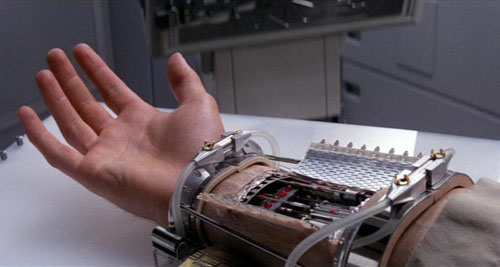I am always amazed that the developments in robotics that are happening in my lifetime. I wish that Isaac Asimov had lived just a bit longer so he could see what the industry is producing today. Sarcos has made the prototype, which is under development in Japan. This robot can recover from pushes intended to topple it over. I’m sure a lot of you have seen the video of the ASIMO robot falling down some simple steps. This new robot with flexible joints and advanced balancing system appears to be the next generation of humanoid robots. For more information, including a video demonstration, check out the full article at NewScientistTech. Found via SlashDot
Flexible joint robot by Sarcos puts Honda’s ASIMO to shame
Related Post
Kevin Warwick wants to be a CyborgKevin Warwick wants to be a Cyborg
Remember at the end of The Empire Strikes Back where Luke gets his hand chopped off by Vader? During one of the closing scenes, a robot doctor finishes up installing a replacement hand for Luke.
Kevin Warwick did something similar as an experiment, but without the whole getting his hand chopped off step. Instead he put an electrode in his hand that could transmit commands to a robotic hand through radio waves. This was done back in 2002, and somehow I never heard of it. I’m sure Ray Kurzweil would be proud. Check out the video below for more information about how he did this, and some other advances like using rat brain cells to power robots. If you are at all interested in robotics, cyborgs, or AI, you’ll be in for a treat.
Isaac Asimov introduces the Radio Shack TRS-80 pocket computerIsaac Asimov introduces the Radio Shack TRS-80 pocket computer
I ran across this ad recently for an amazing new product, promoted by my own favorite science fiction author, Isaac Asimov.
Radio Shack’s TRS-80 Pocket Computer turned my dreams into a reality. Now I can take the power of a true computer with me wherever I go.
— Isaac Asimov
The marketing guys chime in a few paragraphs later.
And it can also function just like a calculator — something a desktop computer can’t do.
— Radio Shack
Wait, what!? With a standard calculator included in just about every phone that I can think of, it is hard to imagine a desktop computer ever existing without that ability. Crazy, right? Now that I think of it, it wasn’t too far in the distant past that desktop computers couldn’t be used for voice communications, something a simple phone could do. So what does $169.95 actually get you?
From Dave Dunfield’s old computer page:
The machine was actually a Radio Shack branded version of the Sharp PC-1211, which features:
- Sharp SC43177/SC43178 4-bit CPU running at 256khz
- 1×24 character LCD display
- 57 key “Qwerty” keyboard
- 1.5k of RAM for user program storage
- Pizoelectric buzzer
Be sure to check out the full breakdown at Dave’s TRS-80 Pocket Computer page
As a point of comparison, here are a few highlights of Motorola’s Droid 2 tech specs:
- 1 GHz processor
- 480×854 Pixel display (Characters displayed depends on the font)
- QWERTY keyboard
- 8GB flash (expandable to 32GB)
- Support for stereo bluetooth (not sure if actual speaker is stereo or not)
- 100’s of other features like camera, video capture, streaming video, and get this includes the ability to make phone calls. Sadly though, it can’t make you breakfast… yet.
Let me whip out my calculator on my i7 Desktop Computer! The Droid 2 has a 3,906.25 times faster processor (just based on clock rate, not actual computational power) and has 5,592,405.33 times more storage. That seems crazy right? The TRS-80 pocket computer came out in 1980, about 20 years ago. I wonder how people will feel about our state of the art smartphones in 2020? That is assuming we haven’t been taken over by robots gone wild, destroyed ourselves with nukes, or succumbed to a raging nano-plague. But that is all just science fiction.
Willow Garage to make domestic robot development open sourceWillow Garage to make domestic robot development open source
I found this C|Net news article via Slashdot talking about a company named Willow Garage that hopes to develop domestic robots, autonomous boats, and autonomous cars. I’m especially interested in this development since I’m such a fan of Asimov, who is attributed to first using the term ‘robotics’. I’m not sure that there will be any sentient robots any time soon, but I’m glad to see that the development information will be open source. I think that keeping the design specifications open will be a good thing, rather then keep them secret which could lead to a monopoly like US Robotics and Mechanical Men in Asimov’s writing.
How far do you think robotics will have progressed 10, 20, or even 50 years from now? I’m interested in reading your comments about this.

